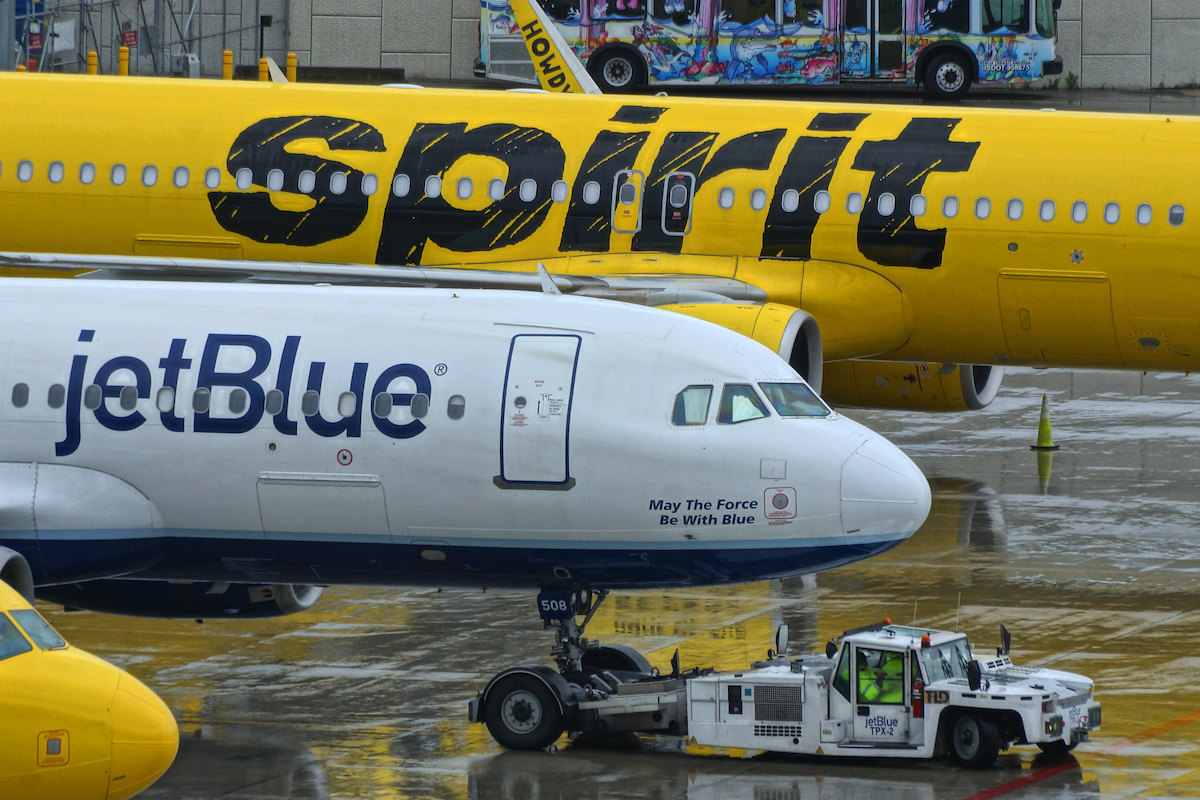Skift Take
Both airlines came to the conclusion that it would be unlikely for them to meet the requirements of the merger by July 24.
JetBlue announced Monday it reached an agreement with Spirit Airlines to terminate its merger.
Both airlines said they thought it was unlikely that all the conditions for the merger would be approved by July 24.
“With the ruling from the federal court and the Department of Justice’s continued opposition, the probability of getting the green light to move forward with the merger anytime soon is extremely low,” Geraghty said in a message to crewmembers Monday morning. “Additionally, the lingering uncertainty is distracting and taking our resources away from more pressing priorities — particularly our work to return to profitability and reinvigorate our brand and culture.”
As part of the merger agreement, JetBlue will pay Spirit $69 million in cash by March 5, according to a regulatory filing. Spirit shareholders received $425 million in prepayments while the merger was still in effect.
“We are proud of the work we did with Spirit to lay out a vision to challenge the status quo, but given the hurdles to closing that remain, we decided together that both airlines’ interests are better served by moving forward independently,” Geraghty said in a statement.
Spirit shares fell around 14% following the announcement. JetBlue’s were up approximately 2%.
JetBlue Aims for Profitability
Without the merger, Geraghty said JetBlue plans to solely focus on its strategy to return to profitability — a strategy that includes increasing capacity on leisure routes while cutting operating costs.
“JetBlue has a strong organic plan and unique competitive advantages, including a beloved brand, a unique value proposition, and high-value geographies,” Geraghty said. “We have already begun to advance our plan to restore profitability. We look forward to sharing more on our progress in the coming months.”
Geraghty said “it was time to write the next chapter,” in the note to crewmembers.
“Almost two years ago, we believed that combining with Spirit would bring many benefits to crewmembers, customers, and communities,” Geraghty said in the note. “It was a bold and courageous plan intended to shake up the industry status quo, and we were right to compete with Frontier and go for an opportunity that would have supercharged our growth and provided more opportunities for crewmembers.”
Spirit CEO Ted Christie said he believed Spirit could survive as an independent airline.
“We are disappointed we cannot move forward with a deal that would save hundreds of millions for consumers and create a real challenger to the dominant ‘Big 4’ U.S. airlines,” Christie said. “However, we remain confident in our future as a successful independent airline.”
A federal judge blocked the merger in January on the grounds that a combined airline would raise fares and harm the most price-sensitive consumers.
“Spirit is a small airline. But there are people who love it,” Massachusetts District Court Judge William Young wrote. “To those dedicated customers of Spirit, this one’s for you. Why? Because the Clayton Act, a 109-year-old statute requires this result — a statute that continues to deliver for the American people.”
Young’s ruling delivered a major victory for the Biden Administration, which has adopted a hawkish attitude toward mergers. The JetBlue-Spirit merger was the first airline merger to be blocked by the U.S. government in nearly 20 years.
JetBlue and Spirit previously appealed an earlier decision to block the merger with the First Circuit Court of Appeals. That hearing was set to start in July.
Attorney General Merrick Garland said Monday that JetBlue’s and Spirit’s decision to abandon the merger showed that the Justice Department proved its case.
“The Justice Department proved in court that a merger between JetBlue and Spirit would have caused tens of millions of travelers to face higher fares and fewer choices,” Garland said. “We will continue to vigorously enforce the nation’s antitrust laws.”
Many Wall Street analysts have said JetBlue would be better off without Spirit since the costs JetBlue would incur from retrofitting planes and combining operations would far outweigh the benefits of a merger.
What’s Next for Spirit?
Now, Spirit faces an uncertain path forward. Some Wall Street analysts speculated in January that Spirit could either face a potential bankruptcy or would need to find another buyer if it could not merge with JetBlue.
Spirit currently has around $1.1 billion in debt due in September 2025. A Fitch Ratings report from January said Spirit faced significant risk in refinancing its debt.
The ultra-low-cost carrier recently hired investment bank Parella Weinberg and law firm Davis Polk & Wardwell to explore restructuring options, according to The Wall Street Journal.
Christie has fired back at the bankruptcy speculation, describing it as a “misguided narrative” during a call with analysts in February.
This story is breaking and will be updated.
The Daily Newsletter
Our daily coverage of the global travel industry. Written by editors and analysts from across Skift’s brands.
Have a confidential tip for Skift? Get in touch
